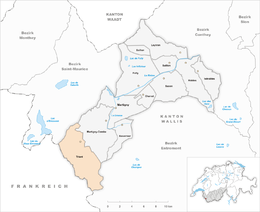Trient, Switzerland
| Trient | ||
|---|---|---|

Trient village
|
||
|
||
| Coordinates: 46°3′N 7°0′E / 46.050°N 7.000°ECoordinates: 46°3′N 7°0′E / 46.050°N 7.000°E | ||
| Country | Switzerland | |
| Canton | Valais | |
| District | Martigny | |
| Government | ||
| • Mayor | Aloïse Balzan | |
| Area | ||
| • Total | 39.56 km2 (15.27 sq mi) | |
| Elevation | 1,300 m (4,300 ft) | |
| Population (Dec 2015) | ||
| • Total | 193 | |
| • Density | 4.9/km2 (13/sq mi) | |
| Postal code | 1929 | |
| SFOS number | 6142 | |
| Surrounded by | Chamonix-Mont-Blanc (FR-74), Finhaut, Martigny-Combe, Orsières, Salvan, Vallorcine (FR-74) | |
| Website |
www SFSO statistics |
|
Trient is a municipality in the district of Martigny in the canton of Valais in Switzerland.
In 1900 the municipality was created, when it separated from Martigny-Combe.
Trient has an area, as of 2011[update], of 39.5 square kilometers (15.3 sq mi). Of this area, 12.4% is used for agricultural purposes, while 31.2% is forested. Of the rest of the land, 0.8% is settled (buildings or roads) and 55.6% is unproductive land.
The blazon of the municipal coat of arms is Azure on a plane in front of mountains Vert a Chamois stantant Argent.
Trient has a population (as of December 2015[update]) of 193. As of 2008[update], 6.2% of the population are resident foreign nationals. Over the last 10 years (2000–2010 ) the population has changed at a rate of 3.5%. It has changed at a rate of 2.8% due to migration and at a rate of 1.4% due to births and deaths.
Most of the population (as of 2000[update]) speaks French (125 or 96.2%) as their first language, German is the second most common (2 or 1.5%) and Portuguese is the third (2 or 1.5%).
As of 2008[update], the population was 47.6% male and 52.4% female. The population was made up of 64 Swiss men (43.5% of the population) and 6 (4.1%) non-Swiss men. There were 73 Swiss women (49.7%) and 4 (2.7%) non-Swiss women. Of the population in the municipality, 53 or about 40.8% were born in Trient and lived there in 2000. There were 45 or 34.6% who were born in the same canton, while 17 or 13.1% were born somewhere else in Switzerland, and 11 or 8.5% were born outside of Switzerland.
...
Wikipedia



